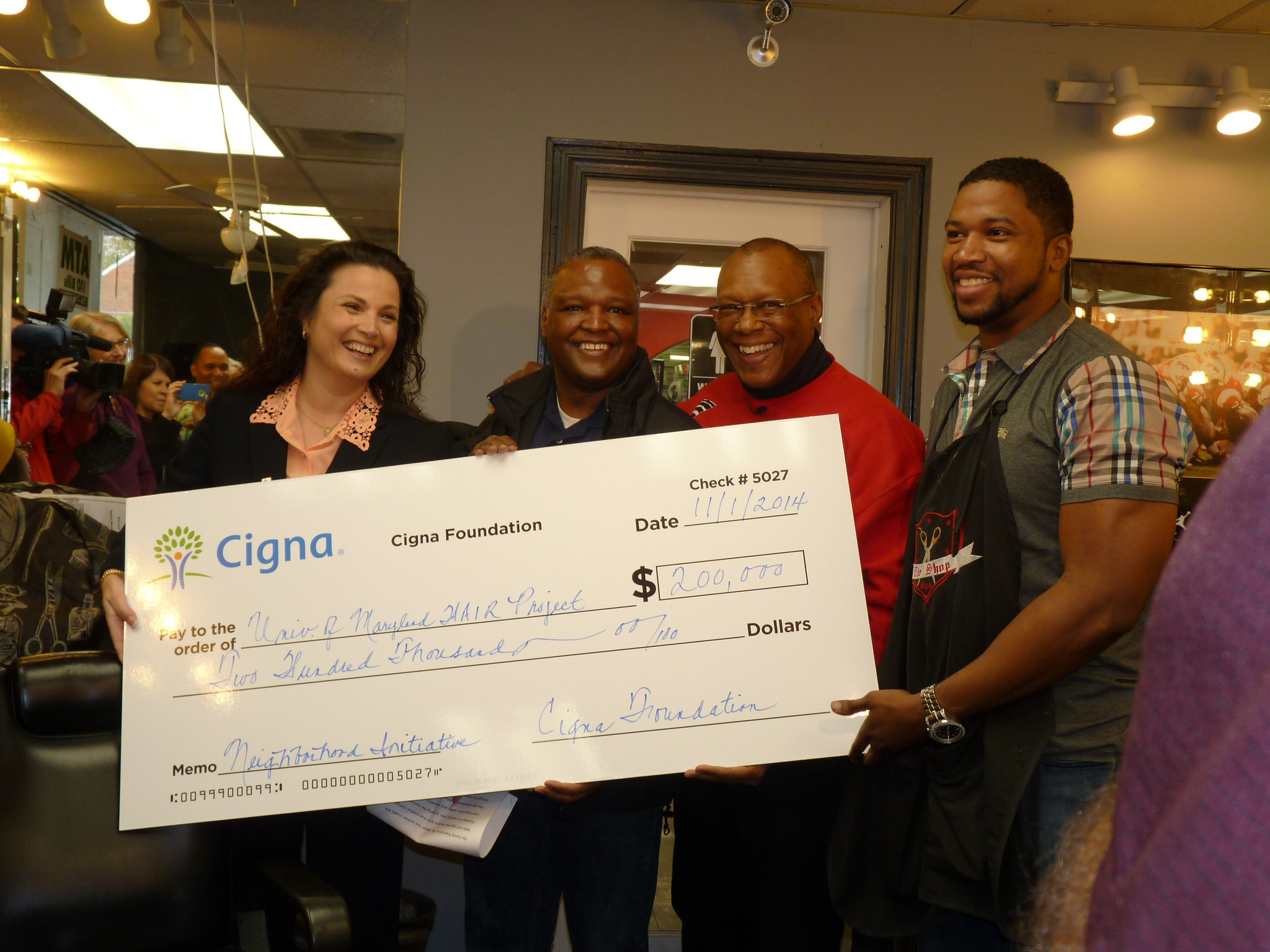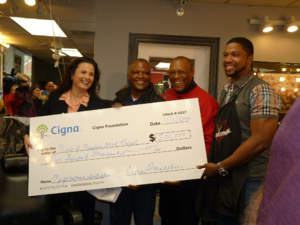Amidst the electric buzz of dryers and raisers and the gentle whiff of hairspray and shaving creams, a life-saving program will be launched in Washington DC that educates the public for more frequent use of hair salons and barbershops. These humble businesses which cater to personal hygiene, have the potential to act as gateways that can save hundreds and thousands of lives.
The Cipla Foundation along with the University of Maryland’s (UMD) School of Public Health and its associated organisation Centre for Health Equity will announce the kick-starting of the Advocates In-Reach and Research (HAIR) program at the Christopher’s Grooming Lounge, located at 705 H Street NE. A demonstration will then follow which will highlight and showcase the benefits of the program.
It appears that a visit to these humble shops can go a long way so as to reduce the incidence of colorectal cancer in African-Americans. According to a 2011 report published by the Centre for Disease Control and Prevention, African-Americans, amongst other racial groups, have the highest rate of colorectal cancer deaths in the country.
“I am very pleased to be a part of the HAIR initiative, partnering with the University of Maryland's Center for Health Equity. I am even more excited that my staff has the opportunity to add such important value to the lives of our customers. Discussing health issues can always be a sensitive subject, so it is a great idea to be able to receive life-saving health information from our technicians. It just makes sense because the community trusts us,” said Christopher Bradley, owner-operator of Christopher’s Grooming Lounge.
The program will be partly funded by a $200,000 grant from the Cigna Foundation with the rest of the money coming from the National Institute of Minority Health and Health Disparity. Through the HAIR program, medical professionals from Capital Digestive Care, LLC, will educate and train beauticians and barbers on the importance of preventing screening for their clients from the age of 45.
This team from Capital Digestive Care, also happens to be the largest gastroenterology group practice in the entire Mid-Atlantic states. They will not only provide clients with consultations but will also screen African-Americans for colorectal cancer.
Over the last decade, Dr. Thomas has conducted extensive research on public health. He feels that the beauty salons and barber shops can be a lot more than just that, they can be transformed into disease prevention centres so as to deliver critical care to communities who are at risk of chronic diseases.
Last November saw Dr. Thomas announce the first phase of the grant in Prince Georgia County, Maryland. Thanks to funding from the Cigna Foundation, the program has now reached the Washington.
“While the Affordable Care Act identified colorectal cancer screening among the preventive services covered at no cost to patients, many people are not having these screenings. This partnership with the Cigna Foundation is recognition that business as usual is not working, and now is the time to invest in new and innovative methods for reaching racial and ethnic minority populations,” said Dr. Thomas.
“Family health history, personal history and race are among the common risk factors for colorectal cancer. A unique component of the project will be the family health histories that M-CHE will train counselors to conduct onsite with clients,” chipped in Dr. Mary A. Garza, M-CHE associate director and principal investigator for the project.
“The Cigna Foundation works to nourish culturally sensitive projects that are incubators for innovation. We’re proud to support this initiative, which will make a difference in improving health here in Washington,” said Julia Huggins, Cigna’s president for the Mid-Atlantic region.
References:
The Cipla Foundation along with the University of Maryland’s (UMD) School of Public Health and its associated organisation Centre for Health Equity will announce the kick-starting of the Advocates In-Reach and Research (HAIR) program at the Christopher’s Grooming Lounge, located at 705 H Street NE. A demonstration will then follow which will highlight and showcase the benefits of the program.
It appears that a visit to these humble shops can go a long way so as to reduce the incidence of colorectal cancer in African-Americans. According to a 2011 report published by the Centre for Disease Control and Prevention, African-Americans, amongst other racial groups, have the highest rate of colorectal cancer deaths in the country.
“I am very pleased to be a part of the HAIR initiative, partnering with the University of Maryland's Center for Health Equity. I am even more excited that my staff has the opportunity to add such important value to the lives of our customers. Discussing health issues can always be a sensitive subject, so it is a great idea to be able to receive life-saving health information from our technicians. It just makes sense because the community trusts us,” said Christopher Bradley, owner-operator of Christopher’s Grooming Lounge.
The program will be partly funded by a $200,000 grant from the Cigna Foundation with the rest of the money coming from the National Institute of Minority Health and Health Disparity. Through the HAIR program, medical professionals from Capital Digestive Care, LLC, will educate and train beauticians and barbers on the importance of preventing screening for their clients from the age of 45.
This team from Capital Digestive Care, also happens to be the largest gastroenterology group practice in the entire Mid-Atlantic states. They will not only provide clients with consultations but will also screen African-Americans for colorectal cancer.
Over the last decade, Dr. Thomas has conducted extensive research on public health. He feels that the beauty salons and barber shops can be a lot more than just that, they can be transformed into disease prevention centres so as to deliver critical care to communities who are at risk of chronic diseases.
Last November saw Dr. Thomas announce the first phase of the grant in Prince Georgia County, Maryland. Thanks to funding from the Cigna Foundation, the program has now reached the Washington.
“While the Affordable Care Act identified colorectal cancer screening among the preventive services covered at no cost to patients, many people are not having these screenings. This partnership with the Cigna Foundation is recognition that business as usual is not working, and now is the time to invest in new and innovative methods for reaching racial and ethnic minority populations,” said Dr. Thomas.
“Family health history, personal history and race are among the common risk factors for colorectal cancer. A unique component of the project will be the family health histories that M-CHE will train counselors to conduct onsite with clients,” chipped in Dr. Mary A. Garza, M-CHE associate director and principal investigator for the project.
“The Cigna Foundation works to nourish culturally sensitive projects that are incubators for innovation. We’re proud to support this initiative, which will make a difference in improving health here in Washington,” said Julia Huggins, Cigna’s president for the Mid-Atlantic region.
References:






